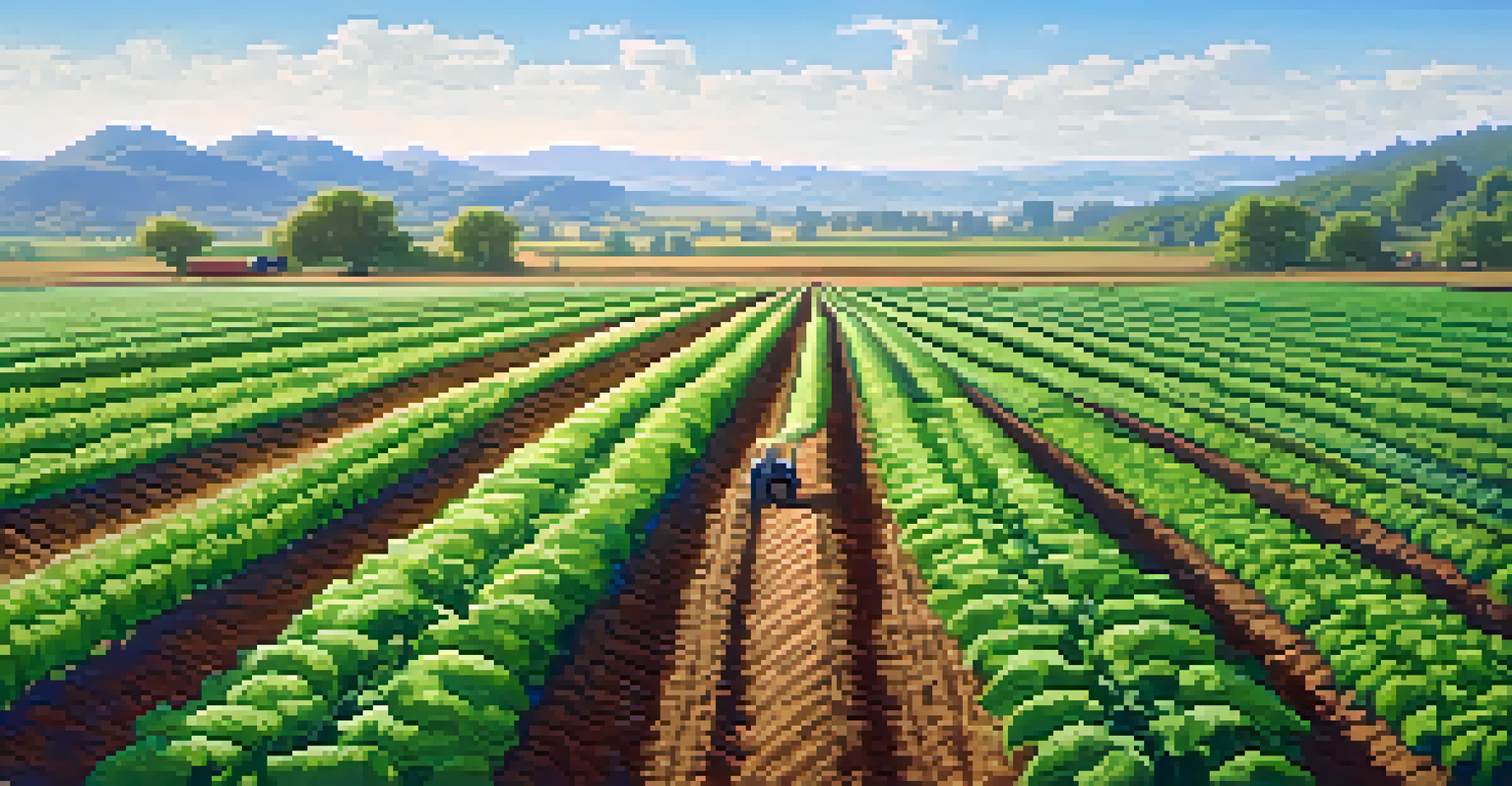Plant-Microbe Interactions: A Key to Sustainable Agriculture

Understanding Plant-Microbe Interactions
Plant-microbe interactions are the dynamic relationships between plants and microorganisms, including bacteria, fungi, and viruses. These interactions can be beneficial, neutral, or harmful, depending on the type of microbe and the plant species involved. Understanding these relationships is crucial for sustainable agriculture, as they can influence plant growth, health, and productivity.
The soil is the great connector of our lives, the source and destination of all.
For instance, beneficial microbes like mycorrhizal fungi form symbiotic relationships with plant roots, enhancing nutrient absorption, particularly phosphorus. On the other hand, some pathogens can cause diseases that severely impact crop yields. By studying these interactions, we can harness their potential to improve agricultural practices.
Ultimately, recognizing the complexity of these relationships allows farmers and researchers to develop strategies that promote beneficial interactions while mitigating harmful ones. This knowledge is a key factor in creating resilient agricultural systems that can withstand environmental challenges.
The Role of Soil Microbes in Agriculture
Soil is teeming with microorganisms that play essential roles in plant health and growth. These soil microbes contribute to nutrient cycling, organic matter decomposition, and disease suppression, creating a thriving ecosystem that supports agricultural productivity. When soil health is maintained, plants can access the nutrients they need more efficiently.

For example, nitrogen-fixing bacteria convert atmospheric nitrogen into a form that plants can use, reducing the need for chemical fertilizers. This natural process not only benefits plant growth but also helps decrease the environmental impact of farming. Healthy soil microbiomes can significantly enhance crop resilience against stressors like drought and disease.
Microbes Enhance Plant Health
Beneficial microbes support plant growth by improving nutrient uptake and providing protection against pests.
By fostering a diverse and balanced microbial community in the soil, farmers can promote sustainable practices that lead to higher yields and lower input costs. This approach aligns with the principles of regenerative agriculture, which aims to restore and enhance the health of our ecosystems.
Beneficial Microbes: Nature's Allies
Beneficial microbes are nature's allies in the quest for sustainable agriculture. These microorganisms, such as rhizobacteria and mycorrhizal fungi, can enhance plant growth, improve nutrient uptake, and even provide protection against pests and diseases. By promoting these beneficial interactions, farmers can reduce reliance on synthetic inputs and improve crop resilience.
Nature does not hurry, yet everything is accomplished.
For instance, certain bacteria can produce natural plant hormones that stimulate growth, while mycorrhizal fungi can extend the root system, allowing plants to access more water and nutrients. This symbiosis not only boosts plant health but also improves soil structure and fertility over time. It's like having a tiny team of helpers working to support plant life.
Integrating these beneficial microbes into agricultural practices can lead to more sustainable outcomes. Whether through biofertilizers or compost teas, the incorporation of beneficial microbes presents an exciting opportunity for farmers to enhance productivity while respecting the environment.
Disease Suppression through Microbial Interactions
Microbial interactions can also play a critical role in disease suppression. Certain beneficial microbes can outcompete pathogens for resources, effectively preventing disease outbreaks in crops. This natural form of pest control can reduce the need for chemical pesticides, thereby supporting sustainable farming practices.
For example, some strains of beneficial bacteria produce antifungal compounds that inhibit the growth of harmful fungi. This means that by fostering a healthy microbial community in the soil, farmers can create a barrier against diseases that threaten their crops. It's a proactive approach to plant health management that emphasizes prevention over reaction.
Soil Health Drives Productivity
A diverse and balanced soil microbiome is crucial for nutrient cycling, disease suppression, and overall agricultural productivity.
Harnessing the power of these beneficial interactions not only helps protect crops but also promotes a balanced ecosystem. This balance is essential for long-term agricultural sustainability, as it reduces chemical dependencies while enhancing the natural resilience of plants.
Microbial Inoculants: A Sustainable Solution
Microbial inoculants are products that contain live beneficial microorganisms and are applied to plants or soil to enhance growth and health. These inoculants can include bacteria, fungi, or both, and their use is becoming increasingly popular in sustainable agriculture. By introducing these helpful microbes, farmers can improve soil health and plant resilience.
For instance, applying a mycorrhizal inoculant can help crops establish stronger root systems, leading to better nutrient uptake and drought resistance. This is especially important in regions facing water scarcity, where every drop counts. The use of microbial inoculants represents a shift towards more eco-friendly farming practices that prioritize biological solutions over chemical inputs.
As research continues to evolve, the potential for microbial inoculants to revolutionize agriculture grows. By embracing these solutions, farmers can not only boost their productivity but also contribute to a healthier planet.
Integrating Microbial Strategies in Farming
Integrating microbial strategies into farming practices requires a shift in mindset and approach. Farmers must consider the soil microbiome as an essential component of their production systems. This means adopting practices that enhance microbial diversity and health, such as crop rotation, cover cropping, and reduced tillage.
For example, rotating crops can help break pest cycles and enhance soil health by introducing different root structures and nutrient needs. Similarly, cover cropping can improve soil structure and provide habitats for beneficial microbes. These practices not only support microbial life but also lead to healthier crops and more sustainable farming systems.
Innovations in Microbial Solutions
Research on microbial inoculants and targeted microbial strategies is paving the way for more sustainable agricultural practices.
The adoption of integrated microbial strategies can foster a holistic approach to agriculture. By working with nature rather than against it, farmers can achieve greater resilience and productivity while supporting the long-term health of their ecosystems.
Future Directions in Plant-Microbe Research
As we look to the future, the research on plant-microbe interactions holds immense potential for advancing sustainable agriculture. Scientists are increasingly focused on understanding the complexities of these relationships and how they can be leveraged to improve crop yields and resilience. This research can lead to innovative solutions that address the challenges of modern agriculture.
For instance, advances in genomics and biotechnology are allowing researchers to identify specific microbial strains that can enhance plant performance. This targeted approach can lead to the development of customized microbial inoculants tailored to specific crops and environmental conditions. The future of agriculture may very well depend on our ability to harness these natural relationships effectively.

Ultimately, a deeper understanding of plant-microbe interactions will pave the way for more sustainable agricultural practices, ensuring food security in the face of global challenges. By prioritizing this research, we can foster a more resilient and sustainable agricultural landscape for generations to come.